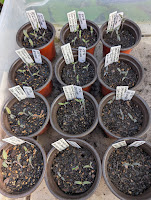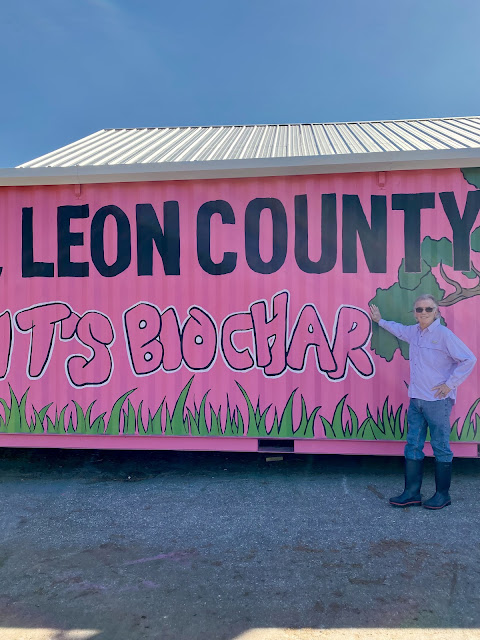On Wednesday, February 26, 2025, a large group of VegHeadz master gardener volunteers visited the reCap Carbon biochar processing facility at the Leon County solid waste management site. Josh Venable, CEO of reCap, and Keelan Bush Rester, the site manager for the plant, explained the process.
 |
| Woody feedstock for biochar |
 |
| Josh Venable |
 |
| Feedstock is fed into grinder |
The plant is currently processing about 1000 pounds of wood waste an hour which produces approximately 200 pounds of biochar or 20% of the feedstock weight. The project presently employs four workers and is preparing to double its capacity. It handles only a small portion of the total wood waste delivered to the solid waste facility, but a larger percentage will be processed as production facilities are added, and markets are developed.
Disposing of wood waste in this way reduces the space needed to store and decompose solid waste, reduces the emission of gases produced in decomposition, and provides an environmentally sound way to dispose of woody biomass. It’s interesting to note that wood wastes resulting from hurricanes and other storms are not processed in this way because that waste is handled under a different contract with FEMA.
Biochar can be created from many different organic materials. Different feedstocks and different processing temperatures produce biochar with different characteristics, suitable for diverse purposes. Biochar is used not only in agriculture, forestry and garden settings, but current and emerging applications include road paving, concrete enhancement, building insulation, waste treatment, pollution remediation in soil and water, and many other environmentally beneficial applications. In whatever way the carbon is utilized, it remains stable for many years, even centuries, preventing it from combining with oxygen to become carbon dioxide.
The process undertaken by Leon County and reCap produces not just carbon credits, but carbon offsets. Carbon offsets serve as “compensation” to an organization or an individual that invests in a project or solution that will reduce future emissions or sequester existing CO2 from the atmosphere. Once created, carbon offsets are also an asset class that trades freely on voluntary carbon markets. Carbon credits limit emissions, while carbon offsets reduce or remove them.
 |
| Germination testing of many different varieties |
 |
| The drum reactor where the feedstock is roasted at very high temperatures to leave the carbon residue known as biochar |
We will continue to keep you updated as we learn more about biochar and its use to improve soil conditions for growing plants, and particularly edible plants. Find out much of what we have already learned about its benefits to garden soil and plants under Garden Resources in the left sidebar. Thanks to Josh and Keelan for guiding us through the process and answering our many questions. Thanks to the gardeners who made notes and took pictures during the site visit. Thanks also to Leon County Office of Resource Stewardship and reCap for undertaking this very interesting and proactive project.
 |




No comments:
Post a Comment